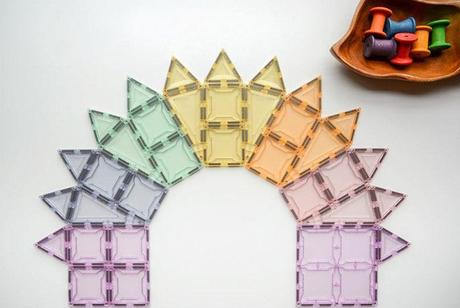Cognitive development in toddlers is essential to their growth, laying the foundation for all future learning and understanding. It encompasses their ability to think, explore, and figure out things about the world around them.
During these formative years, toddlers learn to problem-solve, remember, reason, and start to develop their unique perspective on the world. It is the bedrock upon which all subsequent learning, skills, and knowledge are built.
Here are some key ways play-based learning impacts a toddler’s cognitive development.
Improved Attention Span
In the bustling world of a toddler, wonders wait to be discovered everywhere, and unsurprisingly, their attention often shifts quickly from one fascinating sight to another. However, amid this curiosity, the ability to focus and maintain attention is being honed. Play-based learning can be pivotal in improving a toddler’s attention span, a cornerstone for all future learning.
Imagine a child engrossed in building a tower with colorful and durable magnetic tiles for kids. The process requires them to focus on one task and use their imagination and fine motor skills – all while having fun. It enables toddlers to develop the ability to concentrate intently on a specific activity, which translates into better attention spans in other aspects of their lives.
Enhanced Creativity
Play-based learning provides the perfect fuel to kindle this natural creativity like a waiting spark. Offering a safe and stimulating environment for children to explore and play gives them the freedom to experiment, innovate, and express their thoughts and ideas in unique ways.
Consider a child engaged in pretend play, perhaps imagining they are a pirate on a treasure hunt. This seemingly simple activity is a creative powerhouse. The child is creating a narrative, developing characters, and problem-solving.
They transform their surroundings into an imaginary world, using everyday objects as props in their story. It is creativity in its purest form, unencumbered by rules or restrictions.
Improved Social Skills
The playground, the sandbox, or the living room floor strewn with toys may seem like ordinary play spaces for a toddler. However, these spaces are often the backdrop for the first friendships, conflicts, and resolutions that a child experiences. Play-based learning is not just about cognitive development. It’s also a powerful tool for improving social skills.
When children play together, they navigate a complex social landscape. They learn to share and take turns, to negotiate roles, and to manage conflicts. These experiences are invaluable in teaching children empathy, cooperation, and fairness.
Moreover, solo play also contributes to social development. For instance, a child engaged in pretend play might imagine conversations between their stuffed animals, mirroring and processing social interactions they’ve observed in their environment. Children gain a deeper understanding of social norms and relationships through these playful scenarios.

Better Communication Skills
People trace the roots of communication, a fundamental human skill, back to the early years of a person’s life. Play-based learning plays a significant role in nurturing these early communication skills in toddlers.
During play, children naturally engage in dialogue, whether with their playmates, toys, or even themselves. These conversations might seem trivial to an adult, but they are, in fact, crucial practice sessions for children. They learn to express their thoughts, desires, and emotions, expanding their vocabulary and refining their language skills.
For instance, consider a toddler playing with a toy kitchen set. As they pretend to cook and serve meals, they will likely mimic phrases and conversations they’ve heard in real-life situations. This imitation is critical to language development, helping children understand sentence structure, context, and appropriate usage.
Boosted Memory
Memory isn’t just about remembering facts or events. It’s a cognitive skill that helps us learn from our past, plan for our future, and make sense of our present. Toddlers intrinsically link their memory development to their experiences, and they find a treasure trove of these experiences in play-based learning.
Children interact with objects, people, and situations that create many sensory experiences during play. Each touch, sound, sight, and emotion form a memory. These memories become the building blocks of knowledge, helping children understand and navigate the world around them.
For instance, a child playing with a shape-sorter toy learns about different shapes and remembers which shape fits into which hole through repeated trial and error. This seemingly simple game enhances short-term memory (remembering the shape) and long-term memory (recalling the correct hole).
Develops Fine and Gross Motor Skills
The joyous laughter of a toddler chasing a ball or the intense focus of little fingers trying to thread beads onto a string. These moments of play are also pivotal stages in developing fine and gross motor skills.
Gross motor skills involve the larger arms, legs, and torso muscles. Activities like running, jumping, or throwing during play help develop these skills. A game of catch enhances hand-eye coordination, while a hopscotch game improves balance and agility. These activities not only provide physical exercise but also help children gain control over their body movements.
On the other hand, fine motor skills involve smaller muscle movements, especially those in the hands and fingers. Activities like molding playdough, drawing, or stacking blocks require precision and control. These play activities strengthen hand muscles, improve agility, and lay the foundation for future writing and self-care tasks.
Conclusion
In essence, play-based learning holds the key to multifaceted development in toddlers. Its impact extends beyond cognitive growth, paving the way for creativity, social engagement, communication proficiency, memory enhancement, and motor skills development. The world of play is a rich, exploratory landscape that encourages children to learn at their own pace, using their unique styles.
It’s a platform where mistakes are not failures but opportunities for discovery and growth. As educators, parents, and caregivers, we must value, encourage, and actively participate in play, tailoring experiences that foster holistic development in our young ones. However, it’s equally important to remember that each child is unique with their strengths, interests, and pace of learning. Therefore, being observant, patient, and supportive can make all the difference in their play-based learning journey.
